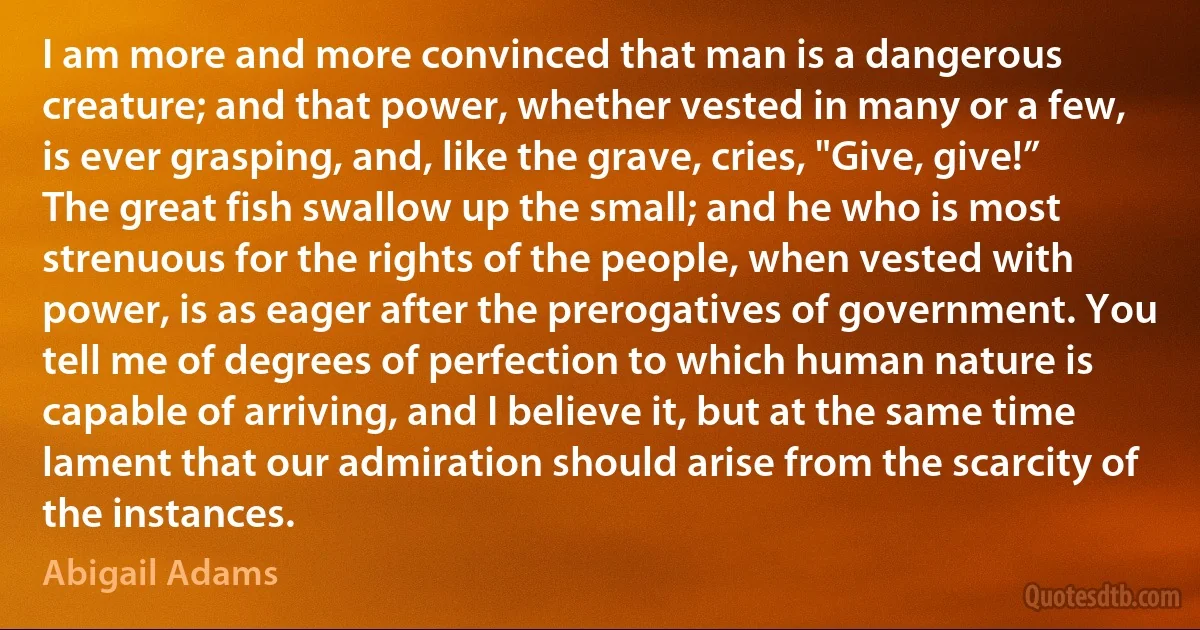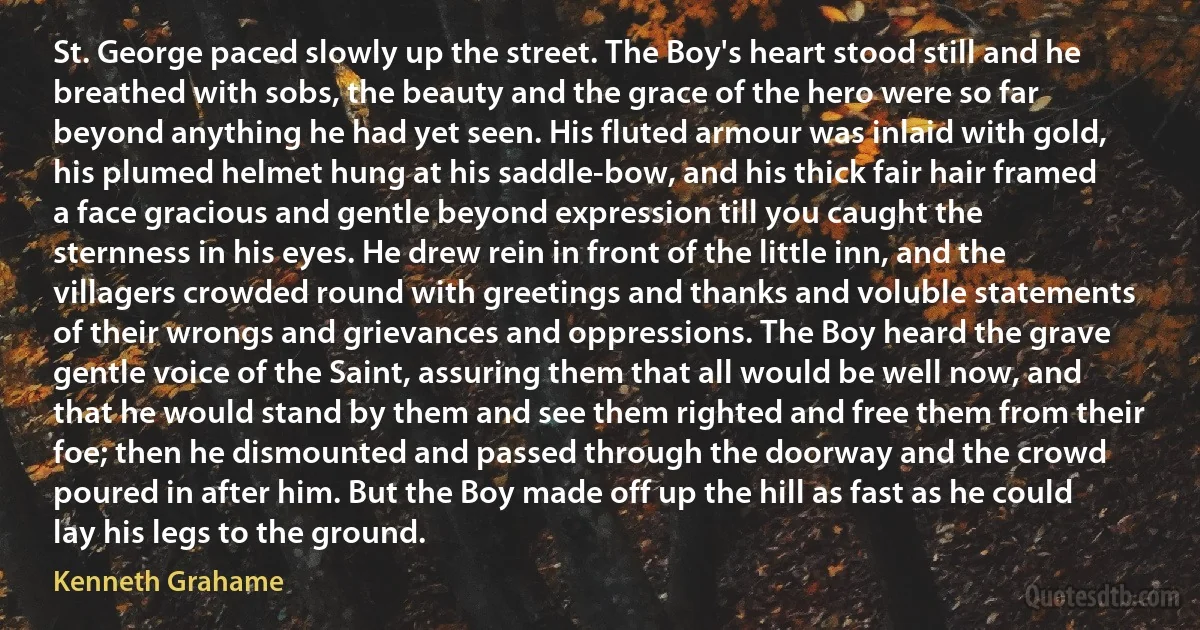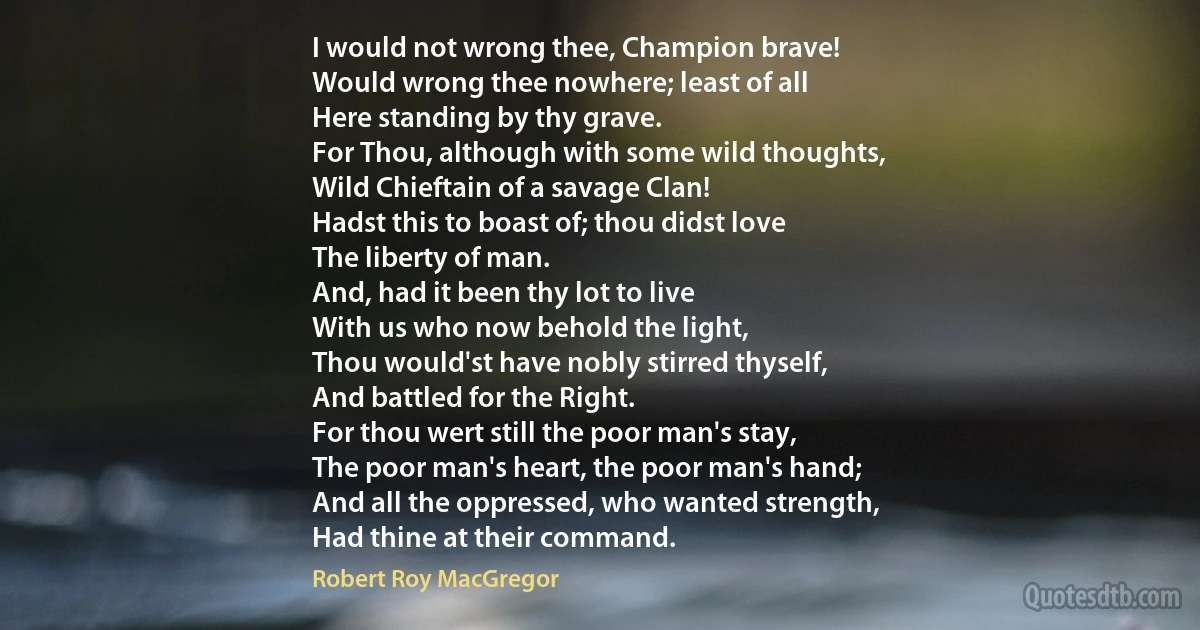Grave Quotes - page 36
The greatest problem is not how to continue but how to exalt our existence. The call for a life beyond the grave is presumptuous, if there is no cry for eternal life prior to our descending to the grave. Eternity is not perpetual future but perpetual presence. He has planted in us the seed of eternal life. The world to come is not only a hereafter but also a here-now.

Abraham Joshua Heschel
Today, grave dangers attend the process of hastening withdrawal, and the legal safeguards will require most careful working out, and even then grave and serious issues might develop. But some hastening of the processes of death is in order and must be worked out. Primarily, however, the will-to-die of the patient is not based at this time on knowledge and on mental polarisation, or upon an achieved continuity of consciousness, but on emotional reactions and a shrinking from pain and from fear. Where, however, there is terrible suffering and absolutely no hope of real help or of recovery, and where the patient is willing (or if too ill, the family is willing), then, under proper safeguards, something should be done. But this arranging of the time to go will not be based on emotion and upon compassion, but on the spiritual sciences and upon a right understanding of the spiritual possibilities of death.

Alice Bailey
Cordelia read the inscription carved deep on the headstone. "At rest": the commonest epitaph of a generation to whom rest must have seemed the ultimate luxury, the supreme benediction.
"It's a nice stone, isn't it?"
"Yes, it is. I was admiring the lettering."
"Cut deep, that is. It cost a mint of money but it was worth it. That'll last, you see. Half the lettering here won't, it's that shallow. It takes the pleasure out of a cemetery. I like to read the grave stones, like to know who people were and when they died and how long the women lived after they buried their men. It sets you wondering how they managed and whether they were lonely. There's no use in a stone if you can't read the lettering."

P. D. James
We shall not meet again: over the wave
Our ways divide, and yours is straight and endless –
But mine is short and crooked to the grave:
Yet what of these dark crowds, amid whose flow
I battle like a rock, aloof and friendless –
Are not their generations, vague and endless,
The waves, the strides, the feet on which I go?

Roy Campbell (poet)
The god of Moses would call for other tribes, including his favorite one, to suffer massacre and plague and even extirpation, but when the grave closed over his victims he was essentially finished with them unless he remembered to curse their succeeding progeny. Not until the advent of the Prince of Peace do we hear of the ghastly idea of further punishing and torturing the dead.

Jesus Christ
I strongly recommend that all read the autobiography of St. Theresa. In spite of the fact that this work went through the "spiritual" censorship of the Church, some amazing pages have been preserved. By propagating the dogma of Jesus Christ as the only begotten Son of God, the Church contradicts the very sense of the prayer given to us by Jesus Christ himself, "Our Father which art in heaven." And also the words of the Scriptures, "So God created man in his own image." (Genesis 1:27) Thus, by claiming the exclusiveness of sonship and divine origin for Jesus Christ, the Church, by that very claim, forever divorced him from mankind. From this came a whole train of grave events; the exclusion of Jesus Christ from the life of humanity, the obliteration of his human Sacrifice and the awful suggestion implying that the death of Christ on the Cross saved humanity from "original" sin (?!) and from all subsequent sins.

Jesus Christ
A reasonable naturalist then settles down to this life with a sort of animal satisfaction. As Chinese illiterate women put it, "Others gave birth to us and we give birth to others. What else are we to do?".... Life becomes a biological procession and the very question of immortality is sidetracked. For that is the exact feeling of a Chinese grandfather holding his grandchild by the hand and going to the shops to buy some candy, with the thought that in five or ten years he will be returning to his grave or to his ancestors. The best that we can hope for in this life is that we shall not have sons and grandsons of whom we need to be ashamed.

Lin Yutang
The wrong policy is the policy which Germany pursued after 1870. Germany made the Triple Alliance an exclusive Alliance, forced the pace in armaments, and that policy produced conditions in Europe which led to war in 1914. I am convinced that is the true reading of history. Precisely because of that, I think it would be a grave blunder for the Allies who won the last War to repeat the German policy of 1870, and so far they have not done so. On the contrary, they have pursued what seems to me the right policy-the League of Nations policy and Locarno... They have got Germany coming into the League of Nations-on to the Council-on equal terms; they have got Germany to come into the joint security, both for France and Germany, of the Treaty of Locarno. That was the right policy. If the Government was about to go and make a separate political Entente with France it would be a departure from the right policy.

Edward Grey, 1st Viscount Grey of Fallodon
The interesting thing about irony for me is that real irony is far more sincere than earnestness. To accept the absurdity of a situation is to accept the humanness of it. Utter sincerity suggests a kind of belief that one knows all there is to know about a given circumstance. That is not to say that one should ever make light of serious and grave and important issues, but that open and genuine intellectual curiosity should never be a casualty in any situation. Irony is not always funny. Humor is not always ironic.

Percival Everett
Let us be understood. If the Japanese surrender after the destruction of Hiroshima, having been intimidated, we will rejoice. But we refuse to see anything in such grave news other than the need to argue more energetically in favor of a true international society, in which the great powers will not have superior rights over small and middle-sized nations, where such an ultimate weapon will be controlled by human intelligence rather than by the appetites and doctrines of various states.
Before the terrifying prospects now available to humanity, we see even more clearly that peace is the only goal worth struggling for. This is no longer a prayer but a demand to be made by all peoples to their governments - a demand to choose definitively between hell and reason.

Albert Camus
Did anybody ever come back from the dead, any single one of the millions who got killed, did any one of them ever come back and say by god I'm glad I'm dead because death is always better than dishonor? Did they say I'm glad i died to make the world safe for democracy? Did they say i like death better than losing liberty? Did any of them ever say it's good to think i got my guts blown out for the honor of my country? Did any of them ever say look at me i'm dead but i died for decency and that's better than being alive? Did any of them ever say here i am, i've been rotting for two years in a foreign grave but it's wonderful to die for your native land? Did any of them say hurray I died for womanhood and I'm happy, see how I sing even though my mouth is choked with worms?

Dalton Trumbo
To even say, ‘What is shariah? Does anyone go by shariah today?', is kufr, declares the Fatawa-i-Rizvia. Even if the words have been uttered to taunt others, they constitute a grave sin. To say, ‘We do not recognize shariah, we go by custom,' is kufr, it declares. The ulema issue a fatwa prohibiting Muslims from joining processions of polytheists. A man says, ‘Issuing a fatwa not to join processions of polytheists, etc., is sheer lathbazi.' The utterance is reported to the ulema. The utterance constitutes denigration of shariah, the Fatawa-i-Rizvia rules, and denigration of shariah is kufr. The man's wife is free of his nikah. ... To question ijma (consensus) or taqlid (literal adherence) is kufr, they declare. ... Not to believe in Fiqh is kufr, they declare. He who does not accept Fiqh is Satan, they declare.

Arun Shourie
You were one of the noblest, the most genuine people, who have ever walked this earth. And though both friend and foe know this, I don't think it unwarranted to verbally bear witness to it before your grave. For we know the world, we know Spinoza's fate. For the world could lay shadows around Nietzsche's memory as well. And therefore I conclude with the words: Peace to your ashes! Holy be thy name to all those to come!

Baruch Spinoza
People are born; leaders are made. I was born the son of a leader with a clear path to a profession of leadership. But whatever leadership I later possessed, I learned from others. I grew up in a household of overt values, many of which hardened in me only as I matured. Although history fascinated me, and mentors surrounded me, the overall direction and key decisions of my life and career were rarely impacted by specific advice, or even a particularly relevant example I'd read or seen. I rarely wondered What would Nelson, Buford, Grant, or my father have done? But as I grew, I was increasingly aware of the guideposts and guardrails that leaders had set for me, often through their examples. The question became What kind of leader have I decided to be? Over time, decisions came easily against that standard, even when the consequences were grave.

Stanley A. McChrystal
This city is grey and miserable. The houses are covered with soot, the people grave and taciturn. Black masses move along the streets; meager and pale faces, the necks bend down. Children are sitting at the street corners, begging. In front of the shops women are standing with old, grey faces.
Night falls. The discharge tubes ignite. Light shines down on misery and filth.
My heart wrenches.
Whores and pimps are dragging themselves through the small and narrow lanes. Yonder red lights are glowing. The evening seems to spread black wings over the city. Richness and misery are living close to each other.
It makes you feel like crying.

Joseph Goebbels
Her ashes are buried at the foot of the grave of my mother, and beside her there is room for mine. Thinking of her, I can well understand the great human yearning that makes for a belief in immortality, but I do not believe in it, and neither did she. We have parted forever, though my ashes will soon be mingling with hers. I'll have her in mind until thought and memory adjourn, but that is all...We were happy together, but all beautiful things must end.

H. L. Mencken



